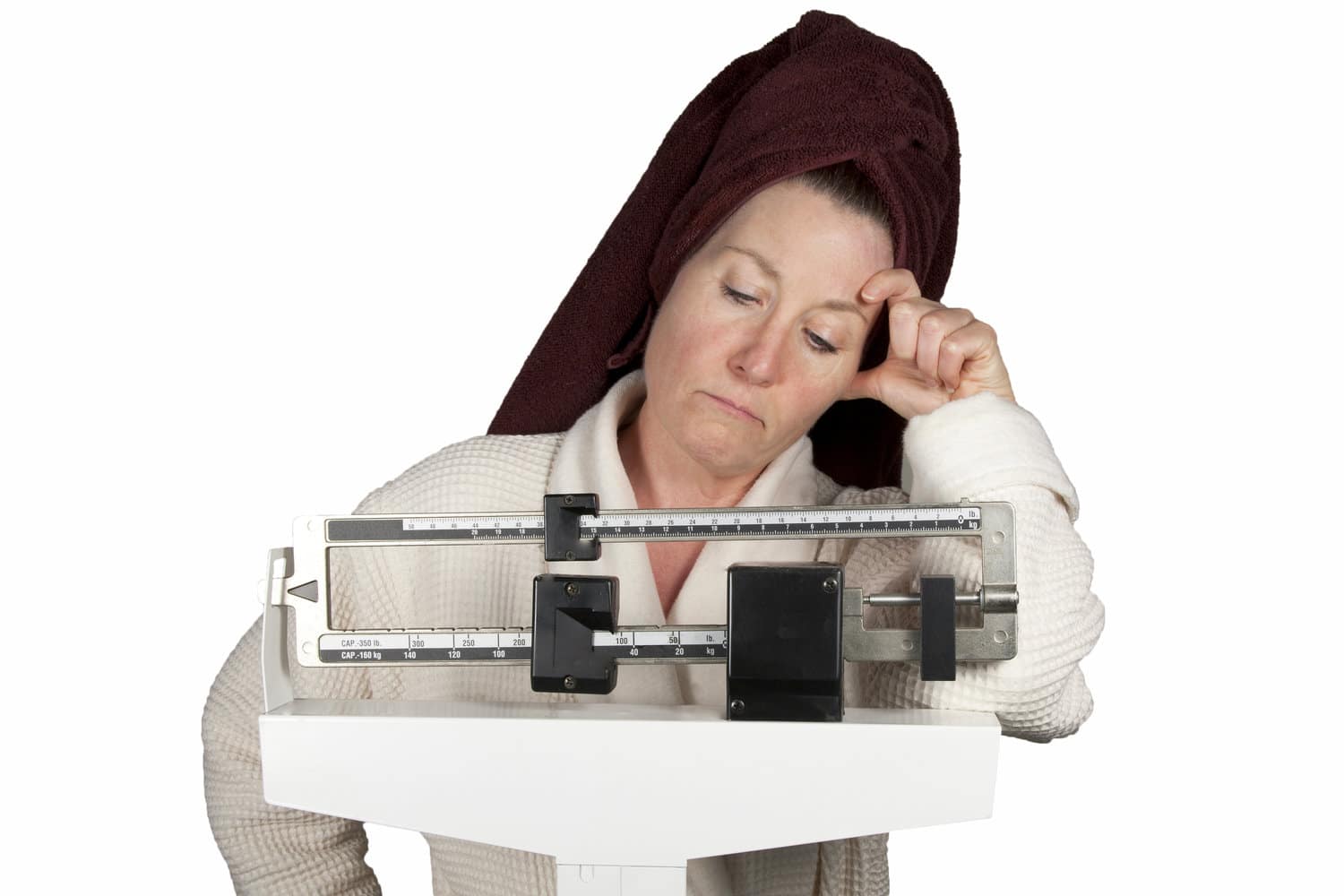
I’m just going to try to eat healthy. I think that’s the best way for me to lose weight.
Evelyn had decided that she wanted to lose weight and lean up. She was almost 50 now and she saw what had happened to some of her friends after passing through menopause. Many of them had gone from being able to “eat whatever I want.” and being thin to suddenly gaining weight in what seemed like an uncontrollable manner.
Evelyn also saw how some of her friends obsessed about losing weight; counting every calorie and exercising like crazy. She didn’t want to live a life like that. She wanted to just eat more healthy foods, drink less alcohol, and eat less bread and sugar. She thought this was a healthy, balanced, and easy approach to losing weight. Besides she didn’t have time to count every calorie and exercise that much.
After proclaiming that she was going to lose some weight (and secretly knowing she had the right formula and her friends should probably loosen up a bit), she started off doing a great job. She had eggs for breakfast, salad for lunch, and broccoli or some other veggie with fish or chicken for dinner. She even started exercising!
She felt great too! She had a real sense of accomplishment and within a few days, she felt a bit lighter and had more energy. This was great!
Then, after about a week she went out with a few of her friends to a Mexican restaurant. The music, the aromas, and the atmosphere immediately caused cravings for a margarita and some chips with salsa. Most of her friends were already indulging, and many of them were thin, so she thought, “how could a few chips and a drink hurt?” And she justified it by telling herself she would do better the next day.
The next morning she woke up a little hungover and feeling slightly guilty about what she had done. She had ended up ordering a taco platter and had eaten slightly too much food. She was proud that she didn’t eat the entire dish but still, she hadn’t followed her plan. She resolved to do better that day, and she did. She was back on track.
But she noticed that some things started slipping back into her diet within another week. She had had bread one night at another restaurant because she was starving when she arrived. She had a few bites of dessert another night because it was her friend’s birthday. And at the end of the week, when she thought about it, she realized she had had 5 glasses of wine altogether.
And the annoying thing was that when she weighed herself she had only lost 1 pound in over 2 weeks. To top it off, she didn’t really know what her guidelines were. If she was supposed to drink less alcohol and eat less sugar, how much did that really mean? Once a week? Twice a week? She realized that she didn’t know where to draw the line.
After going on in this manner for another 2 weeks Evelyn decided to give up trying to lose weight. It was too hard. It was confusing. And it wasn’t working.
Evelyn is just one of many women who have come to me seeking help with weight loss. She sees the whole process as being too difficult for many reasons.
But the most glaring issue is that she initiated the process without having a clear goal of what she wanted to achieve or a specific plan about how she was going to achieve it.
If you want to lose weight or lean up, or really achieve any health goal, your chances of success will go way up if you properly set goals and have a clear plan.
This is not just woo-woo stuff. Research has shown that people that have a goal (1, 2, 3) and a plan (4,5) are more successful with weight loss.
So my professional recommendation is that you sit down and create a goal and a plan.
But please build into your goals a set of skills or behaviors you want to master.

Just setting your goals as a desired weight or waist size will probably just lead to your regaining the weight. It is clear from the research that most people that lose weight gain it back. (6)
I have a few solutions to that problem but definitely during the weight loss process you absolutely need to focus on developing a new self-identity.
And the way to do this is to build new skills and habits that give you unbridled confidence that you can not only lose the weight, but that you are also becoming a different person and therefore you can KEEP the weight off.
I’ll give you an example about how to do this using Evelyn.
If I was working with Evelyn I would ask her to do the following:
#1: Set SPECIFIC goals for her desired weight, clothing size, and body composition. Attach a SPECIFIC DATE to these goals. For example, I want to weigh 135 lbs, be a size 6, and have 22% body fat or lower by September 1.
#2: Set specific skills and habits she wants to acquire during this process. For example, I want to be able to make good food choices regularly, I want to work out 4 days a week, I want to eat 12 servings of vegetables every day, I want to stop eating sugar. These are skills that will help Evelyn reach her goals. But they also should be HABITS that she has by the end of this process so that eating well and exercising are SECOND-NATURE to her. Then she will be a master at maintaining her healthy weight.
#3: State her commitment level. For example, “I am 100% committed to achieving my goals.”
#4: Understand and write down exactly WHY she wants to achieve those goals. This should be a list of several things including superficial as well as super deep reasons such as I want to wear my favorite shorts, I want to feel confident in my ability to take care of myself, and I want to be around for my grandkids.
#5: Create a realistic plan. Goals, skills, and habits don’t just appear. You have to work at them. But the great thing is that you have to work at them GRADUALLY, which really, really reduces the pain of change.
So, design a plan where you work backward from your end date in monthly and even weekly increments. If you want to lose 20 pounds over 5 months that ends up being 4 pounds per month. So make sure your plan allows for that. If you want to be eating 12 servings of veggies per day 2 months from now, that means you better start increasing those veggies slowly but surely starting today.
Ask yourself what you need to do to start building those habits and skills that will carry you to success.
And figure out what you need to be doing and what results are you going to expect one week from now, 2 weeks from now, 6 weeks from now, 2 months from now, and so on.
Spend some time with this. A well-laid plan will almost guarantee success if you truly follow it.
And certainly, it’s probably not worth it to say you are going to embark on a weight loss journey without any plan or goals at all!
- Aspry K1, Dunsiger S, Breault C, Stabile L, DeAngelis J, Wu WC. Effect of Case Management With Goal-Setting on Diet Scores and Weight Loss in Cardiac Rehabilitation Patients. J Cardiopulm Rehabil Prev. 2018 Nov;38(6):380-387. https://www.ncbi.nlm.nih.gov/pubmed/30142129
- O’Hara BJ1, Gale J1, McGill B1, Bauman A1, Hebden L2, Allman-Farinelli M2, Maxwell M3, Phongsavan P1. Weight-Related Goal Setting in a Telephone-Based Preventive Health-Coaching Program: Demonstration of Effectiveness. Am J Health Promot. 2017 Nov;31(6):491-501. https://www.ncbi.nlm.nih.gov/pubmed/27485243
- Fred C. Lunenburg. Goal-Setting Theory of Motivation. INTERNATIONAL JOURNAL OF MANAGEMENT, BUSINESS, AND ADMINISTRATION VOLUME 15, NUMBER 1, 2011. https://static1.squarespace.com/static/5b0b8f55365f02045e1ecaa5/t/5b14d215758d46f9851858d1/1528091160453/Lunenburg%2C+Fred+C.+Goal-Setting+Theoryof+Motivation+IJMBA+V15+N1+2011.pdf
- Luszczynska A1, Sobczyk A, Abraham C. Planning to lose weight: randomized controlled trial of an implementation intention prompt to enhance weight reduction among overweight and obese women. Health Psychol. 2007 Jul;26(4):507-12. https://www.ncbi.nlm.nih.gov/pubmed/17605571
- Schifter, D. E., & Ajzen, I. (1985). Intention, perceived control, and weight loss: An application of the theory of planned behavior. Journal of Personality and Social Psychology, 49(3), 843-851. http://dx.doi.org/10.1037/0022-3514.49.3.843
- Zafra Cooper,∗ Helen A. Doll, Deborah M. Hawker, Susan Byrne, Gillie Bonner, Elizabeth Eeley, Marianne E. O’Connor, and Christopher G. Fairburn. Testing a new cognitive behavioural treatment for obesity: A randomized controlled trial with three-year follow-up . Behav Res Ther. 2010 Aug; 48(8): 706–713. https://www.ncbi.nlm.nih.gov/pmc/articles/PMC2923743/
